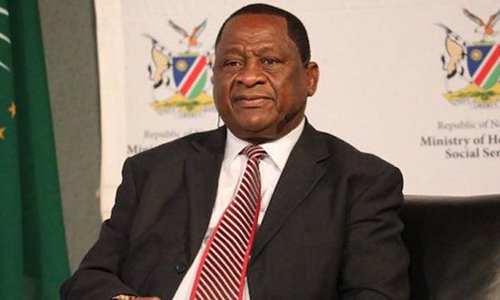Health minister Dr Kalumbi Shangula said the recent executive order signed by United States’ (US) president Donald Trump to withdraw funding from the World Health Organisation (WHO), will likely not affect Namibia.
This is due to bilateral relations and existing projects between the two states.
Shangula told New Era that the US is one of the major funders of the WHO.
The withdrawal will result in reduced funding for the WHO, which will negatively impact the organisation’s operations.
The withdrawal from the WHO was anticipated when Trump won the election.
“Namibia has bilateral funding agreements with the US in the health sector for HIV/AIDS, tuberculosis and other diseases around advocacy, prevention and treatment through the US President’s Emergency Plan for AIDS Relief (PEPFAR), Centres for Disease Control (CDC) and others. We expect that these bilateral programmes will not be affected,” he said.
This is not the first time Trump is making this move.
In 2020, he instructed the director of the Office of Management and Budget to “pause the future transfer of any US government funds, support or resources to the WHO” with “practicable speed” in a move reminiscent of the first withdrawal attempt.
Shangula added that “all Namibian health programmes are funded by the government, and development partners’ contributions amount to 30% of funding”.
He reiterated that as it happened in the past, the WHO will work with member states to minimise the negative impact of this withdrawal by mobilising additional resources.
“Already during the 75th World Health Assembly, member states of the WHO took a historic decision to sustainably finance the WHO. In this regard, member states agreed to a gradual increase in their assessed contributions to represent at least 50% of WHO’s core budget by the 2030-2031 budget cycle,” he said.
Shangula noted that the WHO has done commendable work in supporting member states to manage health challenges through technical support, especially the developing countries.
“Here, in Namibia, the WHO supported the Ministry of Health and Social Services during the plague outbreak in the early nineties and polio in the mid-twenties – just to mention a few. The WHO is indispensable in the contemporary world, where no country is safe from a health emergency if one country is afflicted by that health emergency,” he stated.
At his inauguration as Head of State, Trump last week said the US will leave the organisation.
He added that the global health agency mishandled the Covid-19 pandemic and other international health crises.
Trump said the WHO had failed to act independently from the “inappropriate political influence” of its member states.
He said it required “unfairly onerous payments” from the US, which were disproportionate to the sums provided by other, larger countries, such as China.
Reconsider
WHO director general Tedros Adhanom Ghebreyesus said they regret the announcement that the US intends to withdraw from the organisation.
“We hope the US will reconsider. We look forward to engaging in constructive dialogue to maintain the partnership between the USA and the WHO,” he stated.
He added that the WHO plays a crucial role in protecting the health and security of the world’s people, including Americans, by addressing the root causes of disease, building stronger health systems as well as detecting, preventing and responding to health emergencies, including disease outbreaks, often in dangerous places where others cannot go.
The chairperson of the African Union Commission, Moussa Faki Mahamat, was dismayed to learn of the US government’s announcement to withdraw from the the WHO. “The US, as a member of WHO, was crucial in shaping global WHO instruments and norms on public health security and well-being over the past seven decades,” stated the diplomat.
He said in Africa, the US was an early and strong supporter of the establishment of the Africa CDC, the African Union’s technical agency for public health emergencies that works with the WHO and the global WHO membership to detect, prepare for, respond to and recover from pandemics.
“Today, now more than ever, the world depends on the WHO to carry out its mandate to ensure global public health security as a shared common good. I hope the US government will reconsider its decision to withdraw from this key global organisation, of which it is a founding member,” he stated. -psiririka@nepc.com.na


